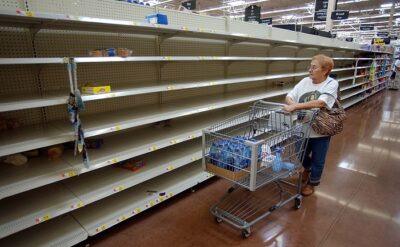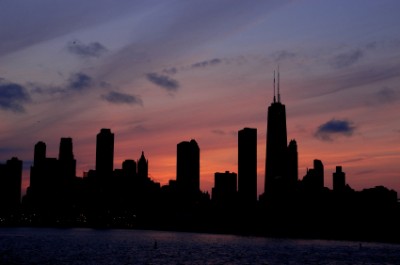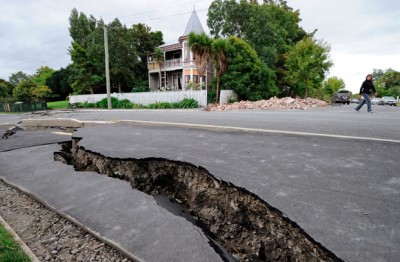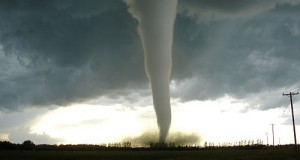
Image source: Pixshark.com
Our modern, materialistic society is largely dependent upon a huge infrastructure as well as a huge web of interconnected supply chains. Just about every item you buy in the store contains parts which have been shipped across the country and around the globe. Even many items that are labelled “Made in America” aren’t really; they contain components from other countries. The only part that is usually American on those products is the final assembly.
While companies can place their manufacturing facilities wherever they want, similar companies tend to need the same things. That need tends to cause them to co-locate, so that they are close to resources and suppliers. So, for example, we could lose Silicone Valley and the vast majority of America’s electronics and computer production if California were ever to fall off into the ocean.
This complex web of product and resource transportation, which is known as the supply line, is essential to modern society. Without it, we would be forced to rely on local production for everything we need. Considering the vast number of products manufactured overseas, it wouldn’t take much to create a serious shortage in critical products.
Adding to the problem is the fact that all modern commerce is computerized. Most money merely exists as an entry in a computer database. Few businesses use cash registers that aren’t actually computers. Gone are the days where a company manager called a supplier on the phone and ordered needed supplies. Today, many Internet orders go through without any human intervention.
We largely ignore this complex system of supply, but we all depend upon it on a daily basis. But what would happen if our supply lines were disrupted? How would we survive? And what sorts of events could cause a serious disruption in our supply lines?
Discover The World’s Healthiest Storable Survival Food!
1. Global War
Wars always disrupt supply lines, even if it is only between the two fighting countries. However, most of the time, the disruption is limited to the region where the fighting is occurring. A global war, like World War II, does much more damage to supply lines, since destroying the enemy’s logistics is a legitimate target of war. Since shipping is targeted, many companies become fearful of losing those shipments. Commerce on a world-wide basis, slows down, except for critically important supplies.
During World War II, German U Boats managed to sink about one-fifth of America’s shipping to England. The trip was so risky that many Americans felt that a Liberty Ship paid for itself if it managed to make one trip across the North Atlantic, unscathed.
2. EMP Attack
An electromagnetic pulse (EMP) occurs when a nuclear weapon is exploded above the atmosphere. Since there is nothing to absorb the energy of the explosion and convert it to blast energy, it goes out in its original electromagnetic form. Such a device, exploded high enough over the center of the United States, would fry all solid state electronics and destroy the power grid. Trucks would not be able to run the highways, phones would not work, computers could not order or track shipments and cash registers would not work. All commerce would grind to a halt.
3. Terrorist Attacks on the Power Grid / Solar Storm
 A terrorist attack on the power grid could be almost as devastating as an EMP attack, at least in its ability to destroy the power grid. Without the grid, it wouldn’t matter if electronic products still worked. Without the power to run them, they would soon quit. A power grid attack would ultimately have the same effect on the supply line as an EMP. A solar storm, like the 1859 Carrington Event, could do the same.
A terrorist attack on the power grid could be almost as devastating as an EMP attack, at least in its ability to destroy the power grid. Without the grid, it wouldn’t matter if electronic products still worked. Without the power to run them, they would soon quit. A power grid attack would ultimately have the same effect on the supply line as an EMP. A solar storm, like the 1859 Carrington Event, could do the same.
4. Cyberterrorism or Hacking
There are many computer hackers in this world, and sometimes they work together. With everything being computer controlled these days, hackers from the other side of the world could shut down entire factories. Worse than that, factories could be destroyed by putting them past their safe parameters. Such an act wouldn’t necessarily be the work of a single hacker, but could be a concerted effort by terrorists or even government agencies.
Both Russia and China have cyber warfare divisions in their militaries. Should the United States prove to be a problem for either of these countries, they could choose to shut down our factories and distribution centers, putting the U.S. in turmoil.
5. Major Earthquakes
Earthquakes are usually a regional event, but there is always the possibility that one earthquake will trigger another. The Earth’s plates rest upon each other, so when one moves, it can affect others. Should a chain reaction take place, it could destroy highways and bridges across the country. Even a single major earthquake in California could have a dramatic impact on the nation due to the amount of food the state produces.
 While the possibility of this sort of disaster is slim, it does exist. If it were to happen, it could shut down the supply lines for months, as new means of moving products were put in place. Replacing the bridges and highways would take even longer.
While the possibility of this sort of disaster is slim, it does exist. If it were to happen, it could shut down the supply lines for months, as new means of moving products were put in place. Replacing the bridges and highways would take even longer.
6. Severe Weather Shifts
The supply line depends upon good weather. While shipping during bad weather is possible, risks and shipping times increase. Severe weather, especially over the Atlantic and Pacific Oceans, could actually bring the supply lines to a halt.
The global warming crowd, which is now the climate change crowd, keeps talking about major climate shifts. They’d better hope they are wrong, as severe climate changes could make the seas impassible. Hurricanes are risky for shipping and enough hurricanes following one after another could eliminate any possibility of a safe route for ships to use.
New Survival Energy Product Makes Every Window A Powerful Solar Collector
7. Financial Collapse
One of the side effects of a financial collapse is a disruption of the supply lines. First, people stop buying luxury products, saving their money for necessities. Then they stop buying major products, like automobiles, repairing their existing ones instead.
These changes result in factories closing. The layoffs from those closures increase the total unemployment and lower the number of consumers who are buying products. Another cycle of manufacturers, distribution centers and retailers close, since there aren’t enough people buying their products. Ultimately, only those companies that are providing the basic necessities survive if the collapse goes on long enough.
While a financial collapse isn’t actually a disruption of the supply line, it has the same effect. The supply line is unable to function, because there aren’t products to ship. Store shelves empty, as people buy the things they need. Once shelves are emptied, the stores can’t refill them.
Another part of this financial collapse is that nobody is willing to sell on credit, due to the high inflation. So, retailers can’t buy the products to stock their shelves. Overseas suppliers, seeing the value of the dollar plummet, stop selling to the country, to avoid taking a loss.
Regardless of the cause for a disruption of the supply lines, the results would end up being the same. People would end up limited to buying products that are locally produced. While a total collapse, where there is no shipping whatsoever, is unlikely, a partial collapse is. In such a case, items that aren’t produced locally would go up in price, due to their rarity.
The end result of any major disruption of the supply line would be that we would lose access to many of the things that make our lives comfortable and enjoyable. We probably would still be able to get necessities, but we may not be able to get the rest.
What would you add to the list? Share your thoughts in the section below:
 Off The Grid News Better Ideas For Off The Grid Living
Off The Grid News Better Ideas For Off The Grid Living




